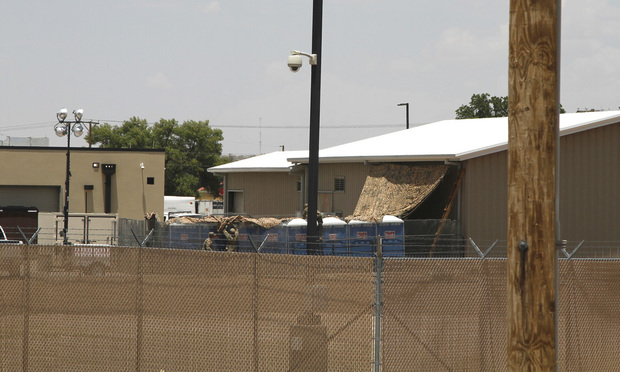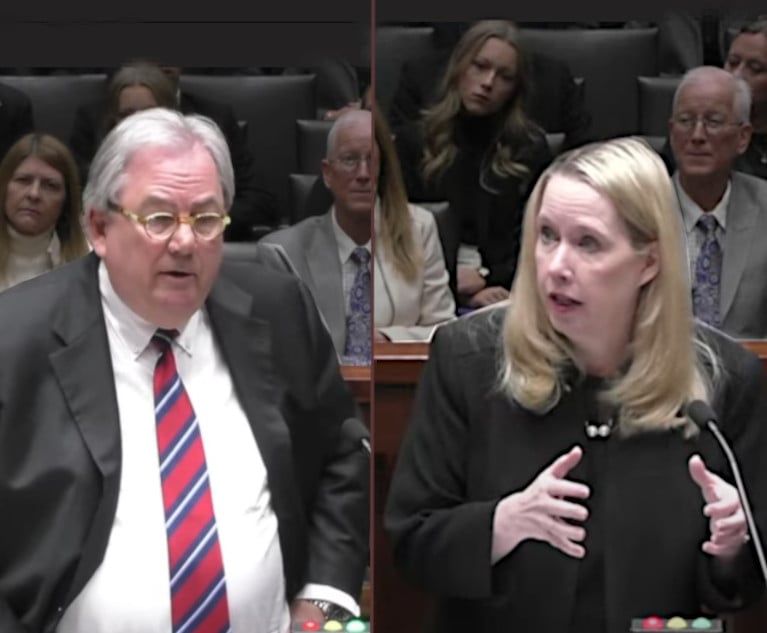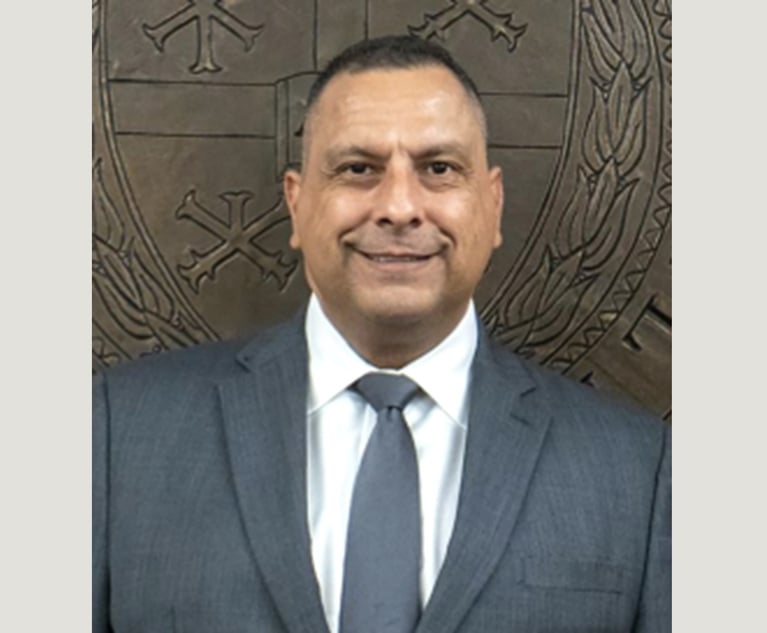Law Prof Who Visited Texas Detention Center Offers Wrenching Testimony
Elora Mukherjee, who heads the Immigrants Rights Clinic at Columbia Law School, found some children who were inconsolable and others who were dirty and had not showered.
July 11, 2019 at 02:43 PM
6 minute read
The original version of this story was published on Law.com
 Border Patrol child detention center in Clint, Texas. Credit: AP
Border Patrol child detention center in Clint, Texas. Credit: AP
The director of Columbia Law School's Immigrants' Rights Clinic is set to testify Friday before a congressional committee about the “urgent humanitarian crisis” she, fellow lawyers and doctors found when they visited a Texas detention center packed with migrant children.
Elora Mukherjee, in 33 pages of prepared remarks to the House Committee on Oversight and Reform on the Trump administration's child separation policy, provides an extraordinary perspective into the three days she and a small team of investigators spent in the facility in Clint, Texas, in mid-June.
The team interviewed nearly 70 children who reported being crammed into cells. In her testimony, Mukherjee wrote the conditions were the worst she has seen in the 12 years she has worked on compliance with the Flores Agreement, a 1997 settlement stipulating the standards for the detention and release of unaccompanied immigrant minors in government custody.
“Never before have we learned of 700 children being detained in a facility built for 104 or 106 adults,” Mukherjee wrote. “Never before have we met with children detained in [Customs and Border Patrol] custody for a week, much less weeks and nearly a month. Never before have we had to directly intervene to get critically ill babies admitted to the hospital.”
Children told thevisitors they lacked adequate bedding, were constantly hungry, had no clean clothes and were denied showers, toothpaste and soap for days on end, she
 Elora Mukherjee. Courtesy photo.
Elora Mukherjee. Courtesy photo.wrote. Older children were left to care for those as young as 2.
The team found evidence that federal agents are continuing to separate migrant children from their parents despite assurances from the administration that the controversial practice had ended. According to Mukherjee's prepared testimony, the number of children in Customs and Border Patrol custody declined significantly since she and others visited after news coverage spurred a public outcry over detention center conditions.
Mukherjee's 10-member team included two other law professors: Bill Ong Hing of the University of San Francisco School of Law and Warren Binford of Willamette University College of Law, both of whom are clinicians.
Despite repeated requests, the investigators were never allowed to tour the Clint facility — children were brought to designated conference rooms for interviews — nor were they allowed to conduct in-person interviews with any children in quarantine for medical reasons.
Agents allowed them to speak with two quarantined children by phone before cutting off access, according to Mukherjee's testimony. She declined an interview request Thursday, saying she was busy preparing for her Capitol Hill appearance.
The visit was deeply unsettling, Mukherjee wrote, and she met with several children too traumatized by their experiences to even speak with her. One 6-year-old girl was unable to say her name or age, and could only repeat the phrase, “I'm scared.”
“In my more than 12 years of working with immigrants, including traumatized children, I have never before met with anyone — adult or child — who could only repeat that they were afraid,” Mukherjee's testimony said.
The visit took an emotional toll on the investigators as well, with Mukherjee reporting about yet another 6-year-old — this time a boy — who was too traumatized to answer most of her questions.
“I spent nearly an hour with this child, first trying to interview him and then just letting him sit on my lap while I rubbed his back,” she wrote. “He wept almost inconsolably for most of the time. At one point, I started tearing up as well.”
Mukherjee said she pleaded with a Customs and Border Patrol lawyer to get the boy adequate care, and the last she saw of him was a guard offering him a lollipop as in incentive to return to his cell.
She wrote she was “appalled” by the physical state of the children she encountered, who appeared in stained clothing and who had no access to hygiene products for days on end, including soap. Mukherjee wrote.
“Typically, when I interview children in detention centers, I try to sit near them, in an effort to build rapport and trust as we discuss sensitive and traumatic issues,” according to her written testimony. “I tried my best to sit near all the children I interviewed in Clint. Multiple children had a strong stench emanating from them because they were dirty and had not showered.”
She even gave bananas and clementines to several children to help alleviate their hunger because many children said they were too afraid of the detention center guards to ask for food. When another member of the investigative team asked an administrator if the agency would consider accepting donations of toiletries and items such as children's books and teddy bears, they were rebuffed, Mukherjee wrote.
The Trump administration has not adhered to a requirement that migrant minors be released to family members or sponsors within 72 hours, she wrote, adding the delays are intended to deter migrants from entering the country.
“The extraordinary trauma inflicted on separated children is not an incidental byproduct of the administration's family separation policy — it is the very point,” she wrote. “The federal government seeks to inflict so much distress on children seeking asylum that other families would be deterred from trying to seek refuge in this country.”
Mukherjee ended her testimony with a series of recommendations, calling for release within 72 hours, “safe and sanitary” conditions and keeping families together.
The committee is also scheduled to hear testimony from three Democratic House members who also toured detention facilities last month, including Alexandria Ocasio-Cortez, as well as Jennifer L. Costello, the acting inspector general of the Department of Homeland Security, and Ann Maxwell, assistant inspector general for evaluation and inspections at the Department of Health and Human Services.
This content has been archived. It is available through our partners, LexisNexis® and Bloomberg Law.
To view this content, please continue to their sites.
Not a Lexis Subscriber?
Subscribe Now
Not a Bloomberg Law Subscriber?
Subscribe Now
NOT FOR REPRINT
© 2025 ALM Global, LLC, All Rights Reserved. Request academic re-use from www.copyright.com. All other uses, submit a request to [email protected]. For more information visit Asset & Logo Licensing.
You Might Like
View All
LSU General Counsel Quits Amid Fracas Over First Amendment Rights of Law Professor
7 minute read

Case With 'Serious Consequences for Corporate Law' Heads to Texas Supreme Court
5 minute read
Trending Stories
- 1Judge Pauses Deadline for Federal Workers to Accept Trump Resignation Offer
- 2DeepSeek Isn’t Yet Impacting Legal Tech Development. But That Could Soon Change.
- 3'Landmark' New York Commission Set to Study Overburdened, Under-Resourced Family Courts
- 4Wave of Commercial Real Estate Refinance Could Drown Property Owners
- 5Redeveloping Real Estate After Natural Disasters: Challenges, Strategies and Opportunities
Who Got The Work
J. Brugh Lower of Gibbons has entered an appearance for industrial equipment supplier Devco Corporation in a pending trademark infringement lawsuit. The suit, accusing the defendant of selling knock-off Graco products, was filed Dec. 18 in New Jersey District Court by Rivkin Radler on behalf of Graco Inc. and Graco Minnesota. The case, assigned to U.S. District Judge Zahid N. Quraishi, is 3:24-cv-11294, Graco Inc. et al v. Devco Corporation.
Who Got The Work
Rebecca Maller-Stein and Kent A. Yalowitz of Arnold & Porter Kaye Scholer have entered their appearances for Hanaco Venture Capital and its executives, Lior Prosor and David Frankel, in a pending securities lawsuit. The action, filed on Dec. 24 in New York Southern District Court by Zell, Aron & Co. on behalf of Goldeneye Advisors, accuses the defendants of negligently and fraudulently managing the plaintiff's $1 million investment. The case, assigned to U.S. District Judge Vernon S. Broderick, is 1:24-cv-09918, Goldeneye Advisors, LLC v. Hanaco Venture Capital, Ltd. et al.
Who Got The Work
Attorneys from A&O Shearman has stepped in as defense counsel for Toronto-Dominion Bank and other defendants in a pending securities class action. The suit, filed Dec. 11 in New York Southern District Court by Bleichmar Fonti & Auld, accuses the defendants of concealing the bank's 'pervasive' deficiencies in regards to its compliance with the Bank Secrecy Act and the quality of its anti-money laundering controls. The case, assigned to U.S. District Judge Arun Subramanian, is 1:24-cv-09445, Gonzalez v. The Toronto-Dominion Bank et al.
Who Got The Work
Crown Castle International, a Pennsylvania company providing shared communications infrastructure, has turned to Luke D. Wolf of Gordon Rees Scully Mansukhani to fend off a pending breach-of-contract lawsuit. The court action, filed Nov. 25 in Michigan Eastern District Court by Hooper Hathaway PC on behalf of The Town Residences LLC, accuses Crown Castle of failing to transfer approximately $30,000 in utility payments from T-Mobile in breach of a roof-top lease and assignment agreement. The case, assigned to U.S. District Judge Susan K. Declercq, is 2:24-cv-13131, The Town Residences LLC v. T-Mobile US, Inc. et al.
Who Got The Work
Wilfred P. Coronato and Daniel M. Schwartz of McCarter & English have stepped in as defense counsel to Electrolux Home Products Inc. in a pending product liability lawsuit. The court action, filed Nov. 26 in New York Eastern District Court by Poulos Lopiccolo PC and Nagel Rice LLP on behalf of David Stern, alleges that the defendant's refrigerators’ drawers and shelving repeatedly break and fall apart within months after purchase. The case, assigned to U.S. District Judge Joan M. Azrack, is 2:24-cv-08204, Stern v. Electrolux Home Products, Inc.
Featured Firms
Law Offices of Gary Martin Hays & Associates, P.C.
(470) 294-1674
Law Offices of Mark E. Salomone
(857) 444-6468
Smith & Hassler
(713) 739-1250






